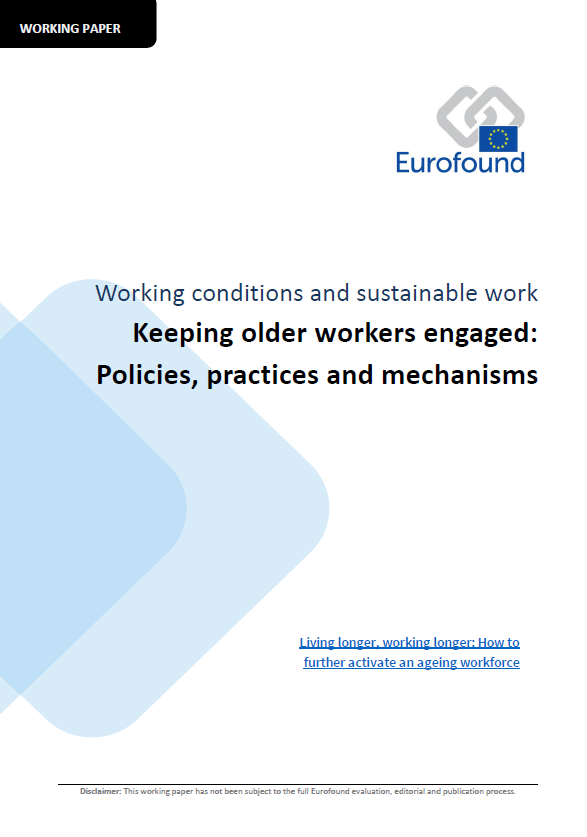EU context
Obwohl in den vergangenen zehn Jahren die Beschäftigungsquoten älterer Arbeitnehmer in vielen EU-Ländern spürbar gestiegen sind, verweist der Gemeinsame Beschäftigungsbericht 2017 der Europäischen Kommission auf das Potenzial zur weiteren Anhebung dieser Quoten. Im Jahr 2016 lag die Beschäftigungsquote älterer Arbeitnehmer zwischen 55 und 64 Jahren in der EU bei 55,3 % und in der Altersgruppe der 15- bis 64-Jährigen insgesamt bei 66,6 %. Bei älteren Frauen wurde der höchste Anstieg verzeichnet.
Die europäische Säule sozialer Rechte schafft einen Rahmen, der den Arbeitsmärkten eine Anpassung an neue Herausforderungen ermöglichen und zugleich Fairness und Solidarität zwischen den Generationen fördern soll. Sie betont das Recht auf ein Arbeitsumfeld, das den beruflichen Bedürfnissen der Arbeitnehmer entgegen kommt, um ihnen eine längere Beteiligung am Arbeitsmarkt zu ermöglichen. Außerdem verpflichten sich die europäischen Sozialpartner in der jüngsten autonomen Rahmenvereinbarung über aktives Altern und einen generationenübergreifenden Ansatz dazu, älteren Arbeitnehmern eine aktive Beteiligung und einen längeren Verbleib auf dem Arbeitsmarkt zu erleichtern.
Tätigkeiten von Eurofound
Bei den Themen im Zusammenhang mit der alternden Erwerbsbevölkerung verfügt Eurofound über ein langjähriges Fachwissen. Seit den 1990er Jahren konzentrieren sich die Untersuchungen auf Themen wie Arbeitsmarktbeteiligung, Arbeitsleistung, Arbeitsbedingungen und Arbeitspräferenzen älterer Arbeitnehmer im politischen Kontext der Veränderungen im demografischen Profil Europas. Weitere Schwerpunkte bilden die staatliche Unterstützung und die betrieblichen Initiativen zur Förderung der Beschäftigung älterer Arbeitnehmer. Untersucht werden auch die Situation älterer Arbeitnehmerinnen, die steigenden Beschäftigungsquoten in dieser Gruppe und ihr zunehmender Anteil in der Erwerbsbevölkerung, besonders in der Gruppe der 55- bis 64-Jährigen.
Erhebungsdaten
Die großen Eurofound-Erhebungen geben Aufschluss über die Situation älterer Arbeitnehmer. In der sechsten Europäischen Erhebung über die Arbeitsbedingungen (EWCS) wird untersucht, wie ältere Arbeitnehmer in verschiedenen Dimensionen der Arbeitsplatzqualität abschneiden. Obwohl ältere Arbeitnehmer seltener Gefahr laufen, ihren Arbeitsplatz zu verlieren als jüngere Arbeitnehmer, belegen die Daten, dass ältere Arbeitnehmer davon ausgehen, beim Verlust ihres Arbeitsplatzes keinen ähnlich bezahlten neuen Arbeitsplatz mehr zu finden und ihre Rückkehr auf den Arbeitsmarkt schwierig wäre.
In einer Studie auf Basis der fünften Europäischen Erhebung über die Arbeitsbedingungen (EWCS) werden die Merkmale der älteren Erwerbsbevölkerung und der Arbeit in unterschiedlichen Altersgruppen sowie Faktoren untersucht, die Arbeit für eine alternde Erwerbsbevölkerung nachhaltig machen: gute Arbeitsbedingungen, physisches und psychisches Wohlbefinden und Vereinbarkeit von Beruf und Privatleben.
Die Europäische Erhebung zur Lebensqualität (EQLS) von Eurofound stellt einen Zusammenhang zwischen verschiedenen Dimensionen der Lebensqualität und dem Alter in Europa her. Eine Analyse der Arbeitspräferenzen in der Gruppe der über 50-Jährigen stützt sich auf die Ergebnisse der dritten EQLS und zeigt, dass viele ältere Arbeitnehmer auch unter Berücksichtigung ihrer finanziellen Bedürfnisse lieber weniger Stunden arbeiten würden. Ein möglicher Anreiz für Arbeitnehmer zum längeren Verbleib im Erwerbsleben wäre eine stärkere Angleichung der Arbeitszeiten an ihre Präferenzen.
Längeres Erwerbsleben
Kürzlich widmete sich Eurofound gemeinsam mit drei weiteren EU-Agenturen dem Thema altersgerechte Arbeit in Europa, den mit der alternden Erwerbsbevölkerung verbundenen politischen Herausforderungen und innovativen Lösungen.
Viele Arbeitnehmer sind nicht in der Lage oder nicht motiviert, bis zum gesetzlichen Rentenalter zu arbeiten. Es gibt aber auch eine Gruppe, die in der Lage und bereit ist, auch nach Erreichen des Rentenalters zu arbeiten. Eurofound hat dieses zunehmende Phänomen der Berufstätigkeit nach dem Renteneintritt untersucht.
Jüngere Forschungen konzentrierten sich auf die Verlängerung des Arbeitslebens durch flexible Ruhestandsregelungen und insbesondere auf Altersteilzeitmodelle, die dies ermöglichen. Bewertungen der bisherigen Laufbahn können ebenfalls zu einem längeren Erwerbsleben beitragen. Es wurde untersucht, wie diese Bewertungen dazu beitragen können, die Möglichkeiten von Arbeitnehmern für ein späteres Ausscheiden aus dem Erwerbsleben zu klären. Vorgestellt werden auch die verschiedenen Instrumente, die von den Unternehmen zur Weiterbeschäftigung älterer Arbeitnehmer entwickelt wurden.
In weiteren Forschungen werden nationale und sektorbezogene Initiativen der Regierungen und Sozialpartner dokumentiert, um ältere Arbeitnehmer im Erwerbsleben zu halten, etwa durch finanzielle Anreize und verbesserte Bedingungen. In einem früheren Projekt wurden vor und nach der Wirtschaftskrise eingeführte Initiativen im Bereich des Altersmanagements analysiert, um bewährte Verfahren in europäischen Unternehmen herauszustellen.
Ressourcen
















